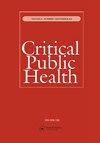艾滋病毒监测中的预测分析需要对公共卫生中的数据伦理、权利和监管采取新的方法
IF 2.3
3区 医学
Q2 PUBLIC, ENVIRONMENTAL & OCCUPATIONAL HEALTH
引用次数: 6
摘要
摘要近年来,大数据驱动的预测分析在公共卫生项目中的应用不断扩大,有望提高效率并改善结果。这篇评论考虑了美国艾滋病毒公共卫生倡议向预测建模的转变。通过两个案例分析,我们分析了突发的伦理问题和风险。我们关注与以下方面相关的潜在危害:(1)在公共卫生系统中对艾滋病毒感染者进行分类,(2)预测方法采用的组合和共享个人健康数据的新方法,以及(3)大数据在公共卫生中的新应用如何挑战公共卫生实践中管理数据重复使用和权利的基本逻辑和监管范式。利用关键技术学术、关键生物伦理学和有组织的艾滋病毒感染者网络的倡导,我们认为利益攸关方应该就监管框架、道德规范、,以及在针对个人的预测性公共卫生干预时代管理艾滋病毒公共卫生数据重复使用的最佳做法。本文章由计算机程序翻译,如有差异,请以英文原文为准。
Predictive analytics in HIV surveillance require new approaches to data ethics, rights, and regulation in public health
ABSTRACT In recent years, applications of big data-driven predictive analytics in public health programs have expanded, offering promises of greater efficiency and improved outcomes. This commentary considers the turn toward predictive modeling in US-based HIV public health initiatives. Through two case studies, we analyze emergent ethical problems and risks. We focus on potential harms related to (1) classifying people living with HIV in public health systems, (2) new ways of combining and sharing individuals’ health data that predictive approaches employ, and (3) how new applications of big data in public health challenge the underlying logics and regulatory paradigms that govern data re-uses and rights in public health practice. Drawing on critical technology scholarship, critical bioethics, and advocacy by organized networks of people living with HIV, we argue that stakeholders should enter into a new range of reform-oriented conversations about the regulatory frameworks, ethical norms, and best practices that govern re-uses of HIV public health data in the era of predictive public health interventions that target individuals.
求助全文
通过发布文献求助,成功后即可免费获取论文全文。
去求助
来源期刊

Critical Public Health
Multiple-
CiteScore
5.90
自引率
7.10%
发文量
36
期刊介绍:
Critical Public Health (CPH) is a respected peer-review journal for researchers and practitioners working in public health, health promotion and related fields. It brings together international scholarship to provide critical analyses of theory and practice, reviews of literature and explorations of new ways of working. The journal publishes high quality work that is open and critical in perspective and which reports on current research and debates in the field. CPH encourages an interdisciplinary focus and features innovative analyses. It is committed to exploring and debating issues of equity and social justice; in particular, issues of sexism, racism and other forms of oppression.
 求助内容:
求助内容: 应助结果提醒方式:
应助结果提醒方式:


